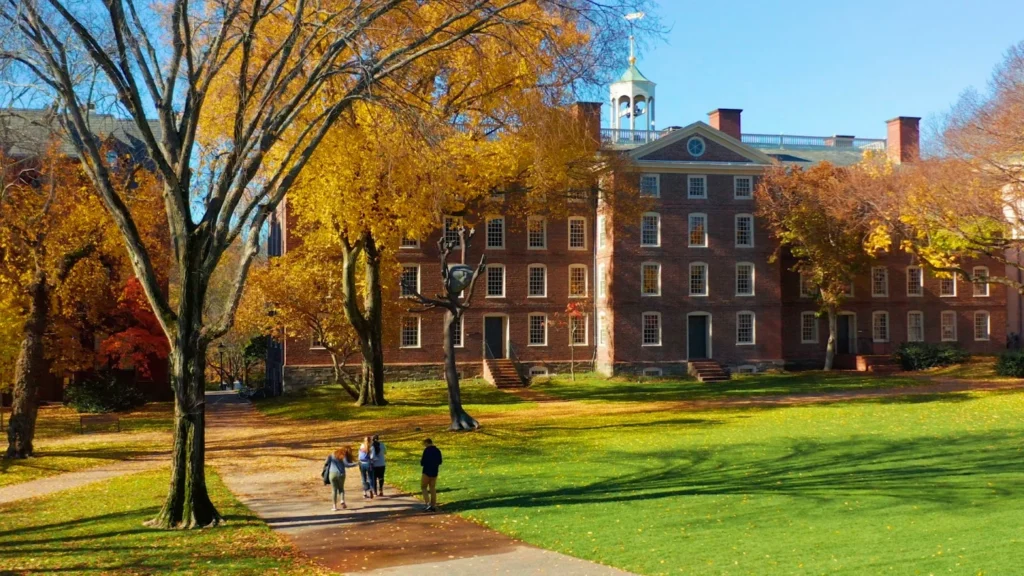Brown University
Brown University is a prestigious private research university located in Providence, Rhode Island. Established in 1764, it is the seventh-oldest institution of higher education in the United States and one of the nine colonial colleges chartered before the American Revolution. Known for its strong academic programs, diverse student body,
and innovative approaches to education, Brown has consistently been ranked among the top universities in the country.
History and Founding
Brown University was founded in 1764 as the College of Rhode Island by the Baptist Minister James Manning and a group of Baptist ministers and laymen. The college was initially located in Warren, Rhode Island, before moving to its current location in Providence in 1770. The decision to locate the college in Providence was influenced by the city’s growing importance as a commercial center and its central location within the colony.
The college’s early years were marked by financial and political challenges,
as it struggled to secure funding and navigate the religious and political tensions of the time. Despite these obstacles, the college continued to grow and develop,
attracting students from across the colonies and establishing itself as a center of learning and intellectual discourse.
Academics and Programs
Brown University is known for its strong academic programs and innovative approach to education. The university offers a wide range of undergraduate and graduate degrees,
with a particular emphasis on the humanities, social sciences, and natural sciences.
At the undergraduate level, Brown’s Open Curriculum allows students to design their own course of study, with no general education requirements. Instead, students work closely with academic advisors to create a personalized program that aligns with their interests and goals. This approach encourages students to explore a variety of subjects and to take an active role in shaping their educational experience.
In addition to its undergraduate programs,
Brown also offers a robust array of graduate and professional programs, including master’s and doctoral degrees in fields such as engineering, medicine, public health, and business. The university is particularly renowned for its strong programs in the humanities and social sciences,
with highly regarded departments in fields like history, political science, and anthropology.
Campus Life and Student Experience
Brown University is known for its vibrant and diverse campus community. The university’s 146-acre campus is located in the heart of Providence,
offering students easy access to the city’s cultural and recreational amenities.
On campus, students can participate in a wide range of extracurricular activities,
including more than 300 student organizations, a thriving arts scene, and a variety of sports and recreational opportunities.
The university’s Division I athletic program fields teams in 36 varsity sports,
and students can also engage in intramural and club sports.
Beyond the classroom and campus, Brown encourages students to explore the world and engage in experiential learning opportunities. The university offers a range of study abroad programs, as well as internships, research projects,
and community service initiatives that allow students to apply their knowledge and skills in real-world settings.
Research and Innovation
As a leading research institution, Brown University is at the forefront of cutting-edge research and innovation across a wide range of fields.
The university’s research portfolio spans the humanities, social sciences, natural sciences, and engineering, with a particular focus on addressing pressing global challenges.
Brown’s research enterprise is supported by a robust network of research centers and institutes, including the Brown Institute for Brain Science,
the Watson Institute for International and Public Affairs,
and the School of Engineering’s Institute for Computational and Experimental Research in Mathematics. These centers bring together interdisciplinary teams of scholars, researchers, and practitioners to tackle complex problems and drive important discoveries.
In addition to its research output, Brown is also known for its commitment to innovation and entrepreneurship. The university’s entrepreneurship ecosystem includes a range of programs and resources,
such as the Brown Entrepreneurship Program and the Nelson Center for Entrepreneurship, that support students, faculty,
and alumni in turning their ideas into viable businesses and social ventures.

Diversity and Inclusion
Brown University is committed to fostering a diverse and inclusive campus community. The university has a long history of promoting equity and social justice,
and it continues to prioritize these values in its admissions, curriculum, and campus life.
Brown’s student body is highly diverse, with students coming from all 50 states and more than 100 countries. The university has also made significant strides in diversifying its faculty and staff, with a focus on recruiting and retaining underrepresented minority and women scholars.
In addition to its commitment to diversity,
Brown also places a strong emphasis on fostering a welcoming and supportive environment for all members of the campus community.
The university offers a range of programs and initiatives aimed at promoting inclusion,
such as the Office of Institutional Equity and Diversity, the Multicultural Center,
and a variety of student affinity groups and cultural organizations.
Notable Alumni and Impact
Brown University has produced a remarkable array of alumni who have gone on to make significant contributions in a wide range of fields,
from politics and business to the arts and sciences.
Some of Brown’s most notable alumni include:
- John F. Kennedy, 35th President of the United States
- Nathanael Greene, Revolutionary War general and second-in-command to George Washington
- Julia Ward Howe, author of “The Battle Hymn of the Republic”
- Esther Safran Foer, author and journalist
- Emma Lazarus, poet and activist
- Ashish Jha, physician and former White House COVID-19 Response Coordinator
Beyond its individual alumni, Brown University has also had a significant impact on the broader society, contributing to advancements in fields such as medicine, engineering,
and the humanities. The university’s research, scholarship, and civic engagement have helped to shape important dialogues and drive positive change on a global scale.
Conclusion
Brown University is a premier institution of higher education that has consistently demonstrated a commitment to academic excellence, innovation, and social impact.
With a rich history, diverse and talented student body, and world-class faculty,
Brown continues to be a leading force in the world of higher education and a beacon of intellectual and social progress.
As Brown looks to the future, it will undoubtedly continue to build on its legacy of excellence and play a vital role in addressing the pressing challenges facing our world.
Whether through groundbreaking research, innovative educational programs, or community engagement,
Brown remains poised to make a lasting and positive impact on the lives of its students and the broader global community.








Can you be more specific about the content of your article? After reading it, I still have some doubts. Hope you can help me.
yes sure
Your point of view caught my eye and was very interesting. Thanks. I have a question for you.